
Categories:
When it comes to self-defense, selecting the appropriate caliber for your gun is crucial. The right caliber can significantly impact your ability to effectively defend yourself in a life-threatening situation. It is essential to understand that there is no one-size-fits-all answer, as individual needs and preferences vary. The choice of caliber depends on various factors such as stopping power, recoil management, accuracy, and concealability.
Stopping power refers to a bullet’s ability to halt an assailant’s actions immediately. Recoil management involves handling the gun’s kickback without sacrificing accuracy and follow-up shots. Accuracy ensures that your shots hit the intended target consistently. Concealability matters if you plan on carrying your weapon discreetly. Consider factors such as personal strength, skill level, and comfort when making this decision.
When it comes to self-defense, choosing the right caliber can greatly impact your ability to effectively neutralize a threat. Several popular calibers have gained recognition for their reliability and stopping power. One widely favored option is the 9mm, known for its manageable recoil and capacity, making it a popular choice among law enforcement and civilians alike. Its effectiveness is attributed to its velocity and expansion capabilities.
Another caliber often considered is the .40 S&W, valued for its balance between magazine capacity and stopping power. With slightly more recoil than the 9mm, it offers enhanced terminal ballistics that can be critical in self-defense scenarios. For those seeking maximum stopping power, the .45 ACP remains a top contender. Renowned for its larger projectile size and slower velocity, this caliber delivers significant energy upon impact.
When selecting a caliber for self-defense situations, it is crucial to consider several factors to ensure effective and reliable protection. First and foremost, stopping power is essential. The caliber should be capable of delivering enough energy to incapacitate an assailant promptly. Additionally, recoil management is crucial as it directly affects accuracy and follow-up shots. A balance must be struck between sufficient stopping power and manageable recoil to maintain accuracy under stress.
Another important factor is ammunition availability and cost. It is vital to choose a caliber that has readily available and affordable ammunition for regular practice sessions. Moreover, gun size and weight should be considered, as they can impact concealability and ease of use in self-defense scenarios. Lastly, personal proficiency plays a significant role; selecting a caliber that one can shoot accurately with confidence is imperative for successful self-defense encounters.
When it comes to self-defense, one of the most debated topics among gun enthusiasts is which caliber provides the best stopping power. The effectiveness of a particular caliber heavily depends on several factors such as bullet design, velocity, and shot placement. Common calibers used for self-defense include 9mm, .40 S&W, and .45 ACP. Advocates of the 9mm argue that it offers a good balance between magazine capacity and recoil control.
It is also widely available and relatively affordable compared to other calibers. On the other hand, proponents of larger calibers like .40 S&W and .45 ACP claim they provide superior stopping power due to their larger bullet size. Ultimately, the choice of caliber for self-defense boils down to personal preference and individual circumstances.
Selecting the best caliber for self-defense is a critical decision that demands careful consideration. When evaluating common self-defense calibers, several factors come into play. One of the primary pros of larger calibers, such as .45 ACP or .40 S&W, is their stopping power. These rounds deliver significant kinetic energy upon impact, potentially incapacitating an attacker more effectively. Moreover, their wider diameter can create larger wound channels, increasing the chances of stopping a threat quickly.
On the other hand, smaller calibers like 9mm offer certain advantages too. They typically have higher magazine capacities and lower recoil compared to larger counterparts, enabling quicker follow-up shots and better accuracy for less experienced shooters. However, it’s crucial to consider the cons as well.
Expert Recommendations: Which Caliber Is Best Suited for Self-Defense? When it comes to choosing a caliber for self-defense, experts often emphasize the importance of shot placement and bullet effectiveness over the specific size or type. While personal preferences may vary, there are several calibers that consistently receive praise for their suitability in self-defense scenarios. One widely recommended caliber is the 9mm.
Known for its manageable recoil and high capacity magazine options, the 9mm offers a good balance between stopping power and ease of use. It is also readily available and affordable, making it an attractive choice for many self-defense enthusiasts. Another popular option is the .40 S&W. With slightly more stopping power than the 9mm, this caliber delivers increased energy transfer to targets without compromising magazine capacity or control.
Lastly, some experts advocate for larger calibers like .45 ACP or .357 Magnum due to their proven track record in stopping power.
When it comes to selecting the best caliber for self-defense, it is crucial to make an informed decision based on your personal defense needs. While there is no definitive answer that suits everyone, several factors should be considered. Firstly, assess the level of recoil you can handle comfortably since this can impact accuracy and follow-up shots. Next, evaluate the effectiveness of the caliber in stopping a threat; penetration and expansion are key considerations here.
Additionally, take into account the availability and cost of ammunition for your chosen caliber, as this will affect your ability to practice regularly. Furthermore, consider the size and weight of guns available in a particular caliber, ensuring it aligns with your comfort level for concealed carry or home defense purposes.
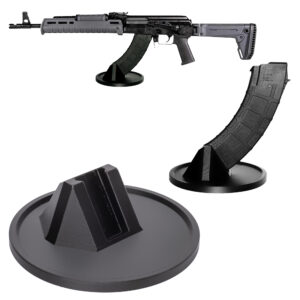
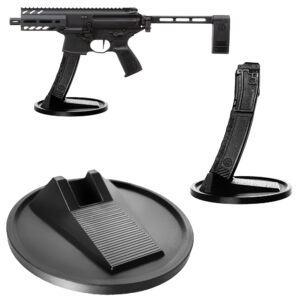
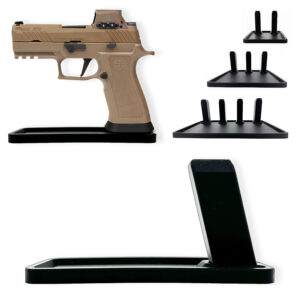


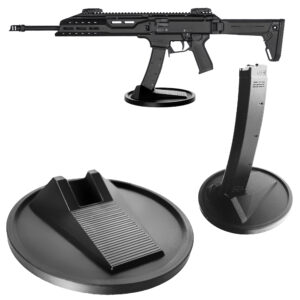
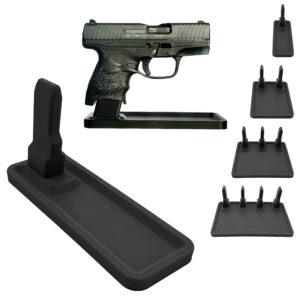

Colt
Colt M4 Carbine
Colt LE6920
Colt AR-15 A4
Daniel Defense
DDM4 V7
DDM4 V9
DDM4 V11
DDM4 ISR (Integrally Suppressed Rifle)
Smith & Wesson (S&W)
M&P15 Sport II
M&P15 Tactical
M&P15T
Bravo Company Manufacturing (BCM)
BCM Recce-16
BCM Recce-14
BCM MCMR Series
Aero Precision
M4E1 Series
AC-15
AR15 Pistol (Various Configurations)
Ruger
Ruger AR-556
Ruger SR-556
Ruger AR-556 MPR (Multi-Purpose Rifle)
Springfield Armory
Saint Victor
Saint Edge
Saint AR-15
PSA (Palmetto State Armory)
PSA PA-15
PSA AR-V
PSA Jakl (AR Pistol)
FN America
FN 15 Tactical Carbine
FN 15 Patrol
FN 15 DMR
Wilson Combat
Recon Tactical
Super Sniper
Protector Carbine
SIG Sauer
SIG M400 Tread
SIG M400 Elite
SIG M400 SDI
LWRC International
IC DI (Direct Impingement)
IC SPR
IC A5
Bushmaster Guns
XM-15 QRC
Bushmaster MOE
XM-15 Patrolman
Rock River Arms
LAR-15 Entry Tactical
LAR-15 Predator
LAR-15 Elite Comp
Stag Arms
Stag 15 Tactical
Stag 15L (Left-Handed Models)
Stag 15 Valkyrie
Noveske Rifleworks
Noveske Gen 4 N4
Noveske Space Invader (AR Pistol)
Noveske Recon
Anderson Manufacturing
AM-15 Optic Ready
AM-15 M4 Carbine
AM-15 Precision Rifle
Adams Arms
AA-15 Piston Rifle
P2 AARS (Adams Arms Rifle Series)
Black Rain Ordnance
SPEC15 Series
BRO Predator
Fallout 15
Diamondback Guns
DB15 Series
DB15CCMLB
DB15EB
Del-Ton Inc.
DTI-15
Del-Ton Echo 316H
Sierra 316M
Windham Weaponry
Windham SRC
Windham VEX-SS
Windham RMCS-4 (Caliber Conversion System)
Christensen Arms
CA-15 G2
CA-15 Recon
CA-15 Titanium Edition
Patriot Ordnance Factory (POF-USA)
Renegade Plus
P415 Edge
Revolution DI
LaRue Tactical
PredatAR
OBR (Optimized Battle Rifle)
LaRue Stealth 2.0
Battle Arms Development
Workhorse Patrol Carbine
BAD556-LW (Lightweight)
Authority Elite Rifle
Faxon Guns
Ascent AR-15
FX-19 (AR Pistol)
Streamline Ultralight Series
KE Arms
KE-15 SLT (Super Lightweight Tactical)
KE-15 Scout Carbine
Primary Weapons Systems (PWS)
MK1 MOD 2-M
MK116 PRO
MK107 (Piston AR Pistol)
ZEV Technologies
ZEV Core Elite Rifle
ZEV AR15 Billet Rifles
Franklin Armory
BFSIII AR-C1
Militia Model
F17-L (Chambered in .17 WSM)
Seekins Precision
SP15 DMR
NX15 Skeletonized Rifle
Havak Bravo
Aero Precision (Additional Models)
EPC-9 (Pistol Caliber ARs)
VG6 AR Rifles
Barrett Guns
REC7 DI
REC7 Gen II
CMMG
MK4 RCE
Resolute 300
Banshee (AR Pistol)
DPMS Panther Arms
Panther Oracle
Panther LR-308
H&K (Heckler & Koch)
HK MR556A1
HK416 (Military Variant)
Rock Island Armory (Armscor)
VR-80 Tactical AR (Shotgun AR Platform)
Troy Industries
Troy SPC-A3
Troy PAR (Pump Action AR)
Wilson Tactical
Tactical Recon AR
Protector Series
F1 Guns
FDR-15 Skeletonized Rifle
BDRx-15 Series
Juggernaut Tactical
JT-15
JT-10 Precision Rifle
AeroSurplus
Surplus AR-15 Rifles (Budget Models)
Thunder Tactical
AR-15 Basic Carbine
Tactical Builder Sets
Radical Guns
RF-15
Forged AR-Series
Dark Storm Industries
DS-15 Featureless Rifles
DS-10 Typhoon
DRD Tactical
Paratus
Aptus AR Rifles
Bear Creek Arsenal
BCA-15
AR Complete Upper Builds
Aero Survival Rifles (ASI)
ASR Tactical Series
Tactical Edge
WARFIGHTER Series
AR-15 Lightweight Rifles
Lone Star Armory
TX15 DMR
TX15 Carbine
HERA Arms
HERA H7
HERA AR-15 Lower Builds
IWI (Israeli Weapon Industries)
Zion-15
DRD Tactical
Tactical Modular Rifles
Quick-Takedown Rifles
V Seven Weapons
1776 Rifle
Hyperlite Rifle
Core Rifle Systems
Core15 Tac III
Core15 Patrol Rifle
Armalite (Original AR-15 Creator)
M15 Tactical
M15 A4 Carbine
DEF15 (Defensive Sporting Rifle Series)
PSA (Palmetto State Armory Additional Models)
PSAK-47 Hybrid (AR-AK Style Hybrid)
PSA Dagger (Pistol Caliber Configurations)
Odin Works
OTR-15
Odin Recon Rifle
Maxim Defense
MDX-508 PDX (Compact AR Pistol)
MDX-510 Rifle